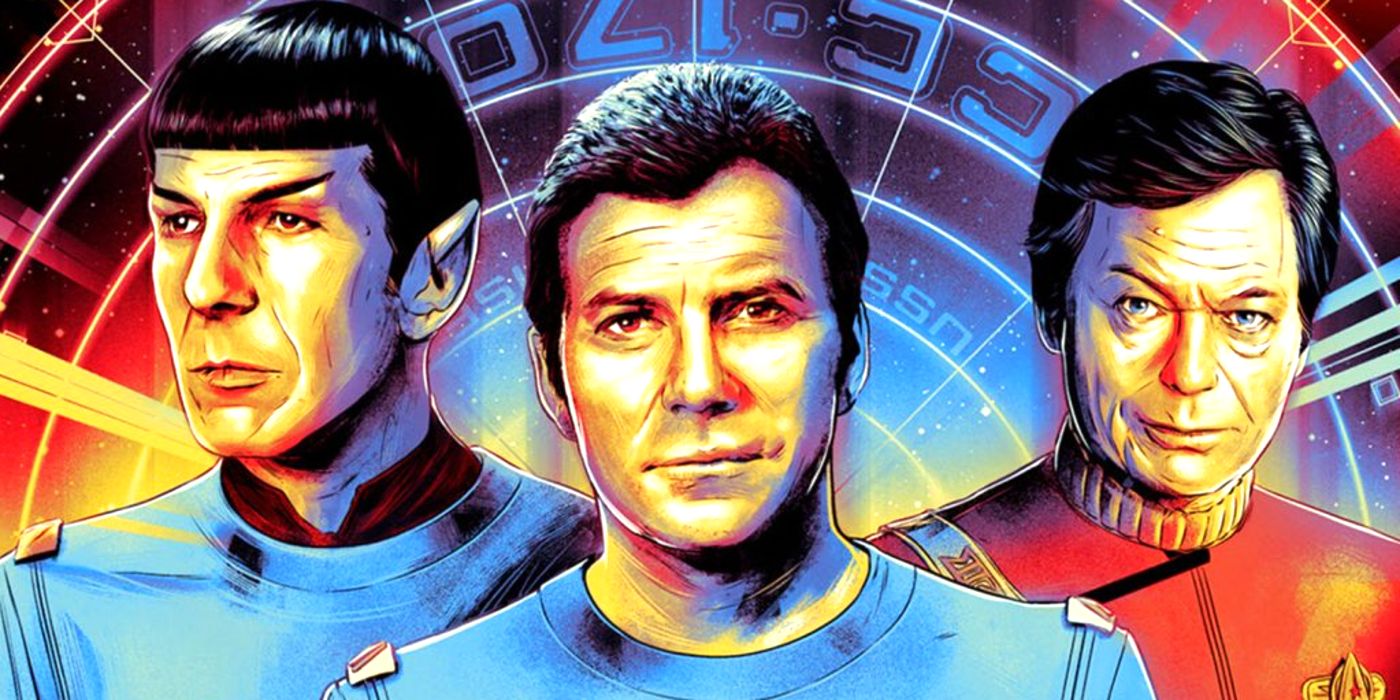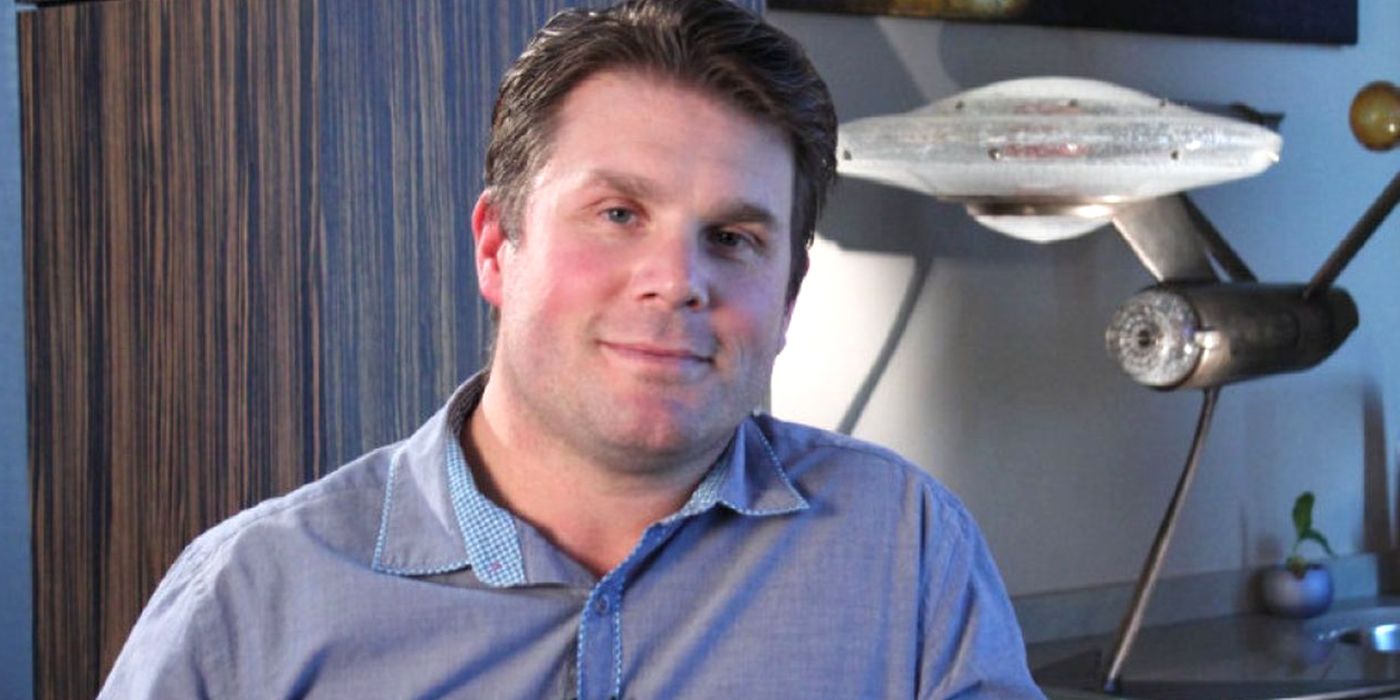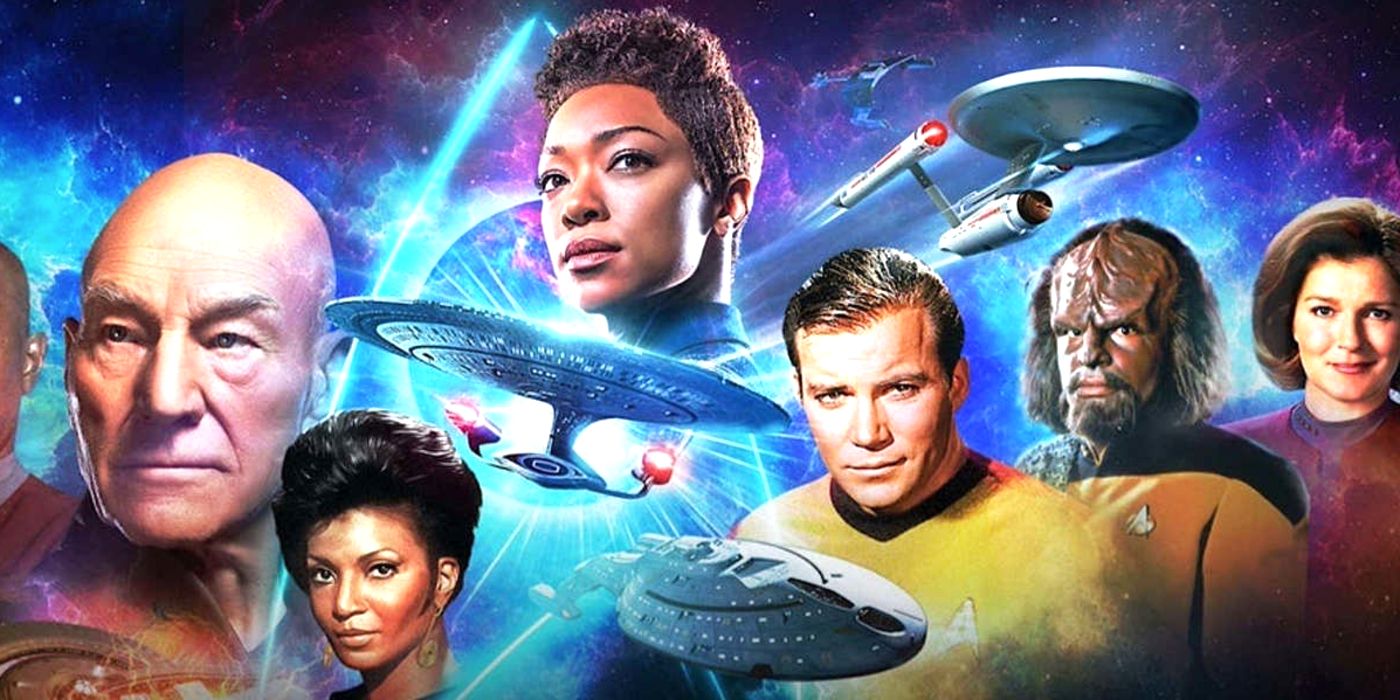
As Star Trek celebrates its 55th anniversary on September 8, 2021, Rod Roddenberry, the son of Star Trek's creator Gene Roddenberry, is continuing his father's mission to ensure the franchise carries on its ideals and legacy. As part of Star Trek's 55th birthday celebration, the first four Star Trek movies will be released for the first time newly remastered on 4K Ultra HD, which hits stores on September 7th. And September 8th is officially Star Trek Day, which will see the casts of past and present Star Trek series engage in panels honoring the franchise's history and teasing what's to come.
Screen Rant had the honor of speaking to Rod Roddenberry about Star Trek's legacy and future. As the CEO of Roddenberry Entertainment, Roddenberry serves as executive producer of the various Star Trek series on Paramount+, including Star Trek: Discovery, Star Trek: Picard, and Star Trek: Strange New Worlds. In an in-depth interview, we discuss the first four Star Trek movies' 4K release, the scope of the franchise from The Original Series to the newest shows, and how Star Trek continues to uphold the message of his father, Gene Roddenberry's optimistic vision of the future.
Screen Rant: Congratulations on Star Trek’s 55th anniversary and happy 100th birthday to your dad, Gene Roddenberry. As a Star Trek fan, it’s the most exciting time since the mid-1990s. So many amazing shows and more coming. How does it feel that Star Trek is having this current renaissance?
Rod Roddenberry: I'm thrilled to death that it's back. After 2005 and [Star Trek:] Enterprise went off the air there was a lull but the fans wanted [Star Trek back]. I think Star Trek is gonna be around for hundreds of years because I think its message is enduring. But I'm glad that it has this resurgence.
The Star Trek that we're seeing today is different than The Next Generation, Deep Space Nine, and Voyager. I think, as an audience, we've matured. I think there's a grittier sense to a lot of [the new shows]. But I'm also thrilled that they've still got the messaging in there. It can sometimes show some of our darker sides, but we do have the characters who stand up and say, "We are better than this. In order to prosper, we need to be better than this. And it isn't the way to be divisive, to be upset, to fear things that are different." And as long as those messages are in Star Trek, to be better than those things, then it's doing its job.
I totally agree. I feel that the core messaging is there, but there's also greater action, incredible effects. Star Trek is at the next level now where it always needed to be. As part of the 55th-anniversary celebration, the first four Star Trek movies are releasing in 4K. Which of the movies is your favorite and why?
Rod Roddenberry: Out of the four? Good question! Most people go to The Wrath of Khan. I'm a Voyage Home kind of guy. There's something beautiful and poetic [about it]. I don't know if it's the hippie-dippie nature in me, but it was such a unique take on saving the whales. I think if someone pitched today, "Hey, we're gonna do a Star Trek about saving the whales," I think they would have been laughed out of the office.
But the way that they did it was beautiful. You had a benevolent lifeform come in just to try to communicate with them. Sadly, it's destroying our planet, but it doesn't know that. But it was trying to talk to the intelligent lifeform that was there before us. And how arrogant we are to think that we are the intelligent ones it's trying to communicate with. For them to go back and realize that because of this horrible message that we killed all the humpback whales, we now need to go back and bring George and Gracie into the future. I just think the messaging on that was on point. It was beautiful, it was environmental, it was ahead of its time, and it allowed us to look at ourselves, our arrogance of today, whether it's the environment or us thinking we know everything, and say, "We've still got a lot to learn."
Absolutely. And The Voyage Home was also the third part of a trilogy that began with Wrath of Khan. It took Spock's story from death to resurrection to becoming the Spock he once was. The other thing I love about it is it's a perfect capstone to this story of Spock and Kirk and their eternal bond.
Rod Roddenberry: The first few movies did an incredible job of showing the crew as a family. The Original Series showed the crew as a family, but those movies really brought them together. You make an excellent point there that I've never actually noticed in my head before: the bonding, and the friendship, and the rebirth of Spock, and how affects his relationship [with Kirk]. That was incredible.

Which of the Star Trek shows is your personal favorite? What was your gateway into Star Trek?
Rod Roddenberry: The Next Generation was what I grew up with, and I really appreciated a crew that collaborated. At a young age, I loved Knight Rider and Starsky and Hutch and those action shows. Trust me, I love action. I loved Star Wars, Stallone, Schwarzenegger, all that sort of stuff. But [TNG] was the first time I saw a crew and a balding, older Englishman as the Captain, but who truly respected the people around him. He only made his decisions based on their expertise and it wasn't about being a leader and ruling with force; it was about, "I want to hear your points of view because I value them and you're the heads of your departments. And then from that, I can make an informed decision."
I think that's a great message for all of us. I think if we listen to the people who we either appoint or believe have greater knowledge than we do in those areas and then incorporate what they say into our own thinking, that's how we will grow and be more intelligent.
My next question was 'Who's your favorite Captain', but I think you just answered it.
Rod Roddenberry: I might surprise you on that one. Picard was always my favorite. Recently, Anson Mount and the way he portrayed Captain Pike in the second of Star Trek: Discovery... He came aboard the bridge, he was humble, he showed his history and what he failed on in his training, and he basically looks at everyone and says, "I am only as good as the people I'm surrounded with. I can only succeed as a Captain with you by my side." He was humble, he was respectful, he did not have to lead with an iron fist. He led by gaining their trust and respect. I think, again, as we just said, we can all be that kind of leader by showing people around us that kind of love and respect.
I'm so glad you brought up Pike because the show I'm most excited to see now is Strange New Worlds. I feel like it has the best of both worlds, to borrow a phrase. It has the nostalgia of The Original Series, but it's looking ahead, and it has Pike, Spock, and Number One on the Enterprise. Can you tell us a little bit about Strange New Worlds? Have you seen any of it?
Rod Roddenberry: Well, I've read the scripts and, unfortunately, there's nothing I can really tell you about it, except the way you've described it is fairly accurate and I think it's gonna bring a lot of those old feelings back. All of the new Star Treks have modernized because we're a mature audience these days, but I really do think you kind of said it. I think it's the best of all the worlds. All I can say is I think you'll be happy.
Speaking of modernizing Star Trek, I don't think JJ Abrams gets enough credit for giving Star Trek that 'cool factor'. Not just updating the visual effects but making it something that non-Star Trek fans, a broader audience could really enjoy too. How do you think Star Trek can be even cooler and appeal to a broader audience?
Rod Roddenberry: In high school, I tried to be cool, and then I grew up and realized how uncool I really was. And now I'm a father and I realized how uncool I really am (laughs). I really do think Alex Kurtzman and the team at Secret Hideout, everyone involved in making the new Star Trek shows, including Lower Decks and the animated series, are really diversifying the style of the shows they've got out there, they are making it -- I don't know if 'cool' is the right thing, but they're making it more appealing to a broader audience. Sure, they've got action and suspense but they're still working in the philosophy and messaging, and I think that's really what makes Star Trek unique, different, and what makes it Star Trek.
It's a great question. I don't know what would make it cooler or more appealing. I think they're doing a great job. And certainly, by updating the first four movies and re-releasing them in 4K for the 55th anniversary, I think that is a step in the right direction for people who have not been introduced to the movies yet. I'm looking forward to seeing it because now we've got 4K TVs so it'll be great to see the older movies that way.

You’re the CEO of Roddenberry Entertainment. Can you talk a bit about your role in the new Star Trek series on Paramount+?
Rod Roddenberry: There are truly so many creative minds making all of the Star Treks. Alex Kurtzman at Secret Hideout, the entire writing staffs for all of the shows. I fell in love with Star Trek because of the IDIC philosophy (Infinite Diversity in Infinite Combinations), the philosophy that my father infused in it. Whether it's Kirk or Spock, I certainly love my characters, that is the approach that I take on it.
So any time a script, revision, outline, or concept comes through, I try to look at it from that point of view. Are we getting an audience member to look at something from a unique point of view? Are our characters behaving in a Starfleet manner? Are they showing fear of a new idea or are they embracing it? Are they evolving and are they growing? Are they representing who we are today? And are they identifying with our characters? That's the tone and direction I approach Star Trek with. We send in our notes and our thoughts and we have meetings about it and it's been a great collaborative opportunity.
I would say so. The proof is in the product. Star Trek has characters like Michael Burnham (Sonequa Martin-Green) who is so conflicted, but able to rise above her mistakes and fight for the greater ideal.
Rod Roddenberry: I love the growth of her character. From a character at the beginning who defies her Captain and, even today, arguably makes a huge mistake or not, because who knows how it would have turned out? But now, in [Star Trek: Discovery season 3], she is the epitome of Starfleet. She and the crew, Saru, all of them, they are in this uncharted future where they have to bring back Starfleet. They have to keep those ideas, ethics, and morals alive. I think season 3, for what I try to contribute to Star Trek, they knocked it out of the park. They really did. The messaging was on point.
Star Trek is built upon your father Gene Roddenberry’s vision of an optimistic future. Belief in science, racial equality, working together towards a common good. It seems to me that Star Trek’s vision is more needed than ever. How do you think Star Trek can get its message out there even further?
Rod Roddenberry: I think everyone is doing it now. Everyone at Paramount and CBS, they understand the strength of Star Trek. I think the new TV series is getting that messaging out there, and I'm sure there will be movies coming out that will continue to do that as well. I mean, that is a great question that I wish I could answer with something unique and different.
I want [Star Trek] to still create stories, and they have in many cases, that allow us to see things from a different point of view. You were saying, and I agree, that we needed [Star Trek's message] in the '60s and we need it today, for sure. It's so divisive out there. And so many of us are willing to speak and not truly listen and not truly hear. That does not mean we need to agree with the other point of view, but to put ourselves in a situation where we're willing to hear an opinion that's perhaps opposed to our own... that is a strength we all have to work on, myself included. Because it is only from hearing that we can grow and evolve, and evolve our own points of view. If Star Trek can keep doing that, and if people can keep seeing the value in that in the episodes, then I think Star Trek is doing a great job.
No comments:
Post a Comment